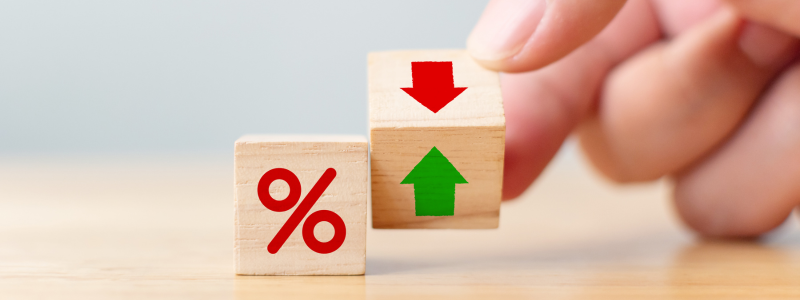Will Interest Rates Continue To Grow?
by Paula Eccleston on Sep 3, 2024 3:21:45 PM
Key Summary
Interest rates have risen in the UK. This has mostly been caused by external factors such as the Russia-Ukraine war, and you may be wondering how this will impact you. Since December 2021, interest rates have increased from 0.1% to 2.25%. This increase is designed to encourage saving, which in turn impacts spending. Rising interest rates affect the housing and motor finance industry the most. Mortgage rises as a result of interest rate rises are common, and this is the same for finance if you are looking for a new agreement. Even though rising interest rates can hurt car finance, the market is behaving well. Growing from 2021, the market has showed significant strength in the wake of rising interest rates. Before entering into an agreement, the best bet is to compare interest rates and get the best deal for you.
As a result of rising inflation, brought on by rising energy and food prices caused by Russia’s invasion of Ukraine, the Bank of England has increased interest rates to 2.25% for the seventh consecutive time since December 2021. The release of the mini-budget on 24 September by the Conservative party and the subsequent pound fall is predicted to cause further interest rate rises as the Bank of England (BOE) look to halt even more inflation. However, it is essential to note that current interest rates are a fraction of what they were in 2008, and recovery is possible.
How have interest rates changed?
Why does increasing interest rates lower inflation
How is the Bank of England base rate set?
Why do rising interest rates matter?
What can I expect when I renew my mortgage or car finance agreement?
How have rising interest rates impacted businesses?
How has this impacted the car finance market?
Are any other countries raising their interest rate?
How Have Interest Rates Changed?
Since December 2021, the cost of borrowing has increased from 0.1% to 2.25%. This move attempts to encourage saving instead of spending and prevent increases in price. Interest rates are predicted to grow even further, to around 4.25% in March next year. Interest rates have steadily risen since 2013 and are expected to grow further. Interest rates and inflation have an inverse relationship: when interest rates are low, inflation rises, and when interest rates are high, inflation reduces.

Why Does Increasing Interest Rates Help Lower Inflation?
Interest rates increase the cost of borrowing and thus incentivise customers from borrowing to spend. Conversely, low-interest rates encourage people to borrow to pay, increasing demand and the price of goods and services. A sharp price increase can somewhat lead to inflation, although other factors are also responsible such as supply, an issue we have seen with the rise in oil prices due to the war in Ukraine.
How Is The Bank Of England Base Rate Set?
The Bank of England’s Monetary Policy Committee sets the Bank Rate every six weeks. The bank rate is the most important interest rate in the UK, as it sets the interest rate we pay commercial banks for holding our money and determines the rates these banks charge people to borrow money. The current trend for bank rates is shown below. Bank rate directly influences interest rates and is a massive part of Monetary Policy and its effort to reduce inflation.
Why Do Rising Interest Rates Matter?
Interest rates affect the fundamental principles of the economy and thus have a significant impact. A change in interest rates directly influences spending, which influences price. Rising interest rates have somewhat reduced the value of our currency and the value of money we put away. Rising interest rates massively reflect the state of our economy and offer an insight into future customer behaviours; rising interest rates will reduce borrowing for large purchases and thus will have a substantial impact on the housing market and possibly the motor industry.

What Can I Expect When I Renew My Mortgage Or Car Finance Agreement?
Many consumers have seen mortgage rates rise considerably in the last month, with some having offers completely withdrawn and others committing to higher mortgage payments. The rise in bank rates has increased the prices of mortgages, which is expected to continue as the BOE remains involved in re-balancing the UK economy. However, the housing market has been in a bubble for some time now, and a crash is predicted in the future. This would dramatically reduce prices, and repayments would be significantly less if mortgage rates remained the same. There is hope for the housing market and those looking to buy a new home.
In terms of car finance, if you renew your car finance agreement or refinancing, you may notice that the interest rate you’re offered is higher than your existing contract. This is because car finance lenders are having to pay a higher interest rate to the banks themselves in order to obtain the funds, and whilst they try their best to absorb as much of this as possible, they often have no choice but to pass on some of this cost to customers.
How Have Rising Interest Rates Impacted Businesses?
For businesses across the UK, there have been unprecedented challenges to face, with Covid-19 and the ensuing lockdowns as well as political instability, a depreciating pound and sharpening interest rates. When consumer confidence has fallen, a negative contraction from 102.1 in 2021 to 93.1 in August 2022, businesses have generally responded well to the loosening of lockdown measures. Business is higher in most industries in 2022 compared to 2021, and the car finance industry is no exception.

How Has This Impacted The Car Finance Market?
The consumer used car finance market is up 13% in value in 2022 compared to the year prior and 3% higher in volume compared to 2021. Compared to the new car finance industry, used car finance performs stronger and shows more growth potential. The new car finance market saw a fall in value of 5% and a fall in volume of 14%. Supply issues due to the pandemic impacting manufacturers have played a massive part in the new car finance industry’s downturn and the growth in the used car finance market. The Auto Trader retail price index shows second-hand values are 15% higher than last year, indicating the strength of the market and the significant demand for used cars.
However, the very nature of car finance is directly influenced by the BOE bank rate and a rising rate over the last year provides cause for concern. An increase in interest rates, ultimately disincentivising borrowing, will lead to a reduction in car finance agreements taken out, coupled with an increase in the cost of living and people saving; the used car finance industry will likely see a fall in volumes from the year prior. During the pandemic, many car finance firms chose to close and place staff on furlough, which showed that no industry was shielded from economic impacts. The increase in interest rates and cost of living could have a similar but reduced effect. During the pandemic, Marsh Finance is proud to have stayed open and avoided placing any of our staff on furlough, but other firms felt the financial pinch harder and thus decided to close and furlough. Increased borrowing rate not only affects the customer in their spending decision but also businesses looking to secure funding lines.
When borrowing is discouraged, and APR rates increase, some dealerships will face the pinch more than others. Richard Bartlett-Rawlings, the automotive manufacturing specialist at RSM UK, told AM Online that rising interest rates will affect some more than others. He believes that franchised, well-established dealers will feel the effects less than others due to long-standing partnerships with manufacturers that will limit supply issues and economic loss. Some have conflicting views, believing the car market is strong and demand will not reduce. In these times when consumer confidence is dwindling, demand may be there, but customers are likely to put off a car purchase until the financial situation has calmed. In the meantime, customer support is vital as they look to cope with rising interest rates as much as businesses do. Customer support at every level will be more critical than ever.
Are Any Other Countries Raising Their Interest Rates?
As of July 2022, inflation in the EU was lower than in the UK at 9.8%. Although lower, inflation has risen massively from 2.5% the year prior. This is partly due to the ongoing energy crisis in Europe. Compared to the rest of Europe, the UK is near the middle regarding interest rates, with France, Germany and Italy below. Countries with higher interest rates include Spain and Netherlands, with Latvia (21.3%) and Lithuania (20.9%) being the highest. The full breakdown can be seen below.

A Look To The Future
Interest rates are predicted to rise further as inflation surges. Many economists believe interest rates could increase to as high as 4.25% by March 2023. The energy crisis shows no signs of slowing down, and interest rates will continue to climb. A contraction for the car finance industry is possible as borrowing continues to fall. Rising mortgage rates may also impact the industry, with customers prioritising a house over a car. The initiative will have to adapt and change with the times as interest rates, oil prices and consumer confidence all play a part in the coming months.
- June 2025 (17)
- May 2025 (10)
- April 2025 (5)
- March 2025 (6)
- February 2025 (4)
- January 2025 (4)
- December 2024 (10)
- November 2024 (14)
- October 2024 (12)
- September 2024 (25)
- August 2024 (77)
- February 2024 (1)
- May 2023 (2)
- March 2023 (1)
- February 2023 (1)
- December 2022 (1)
- October 2022 (2)
- August 2022 (1)